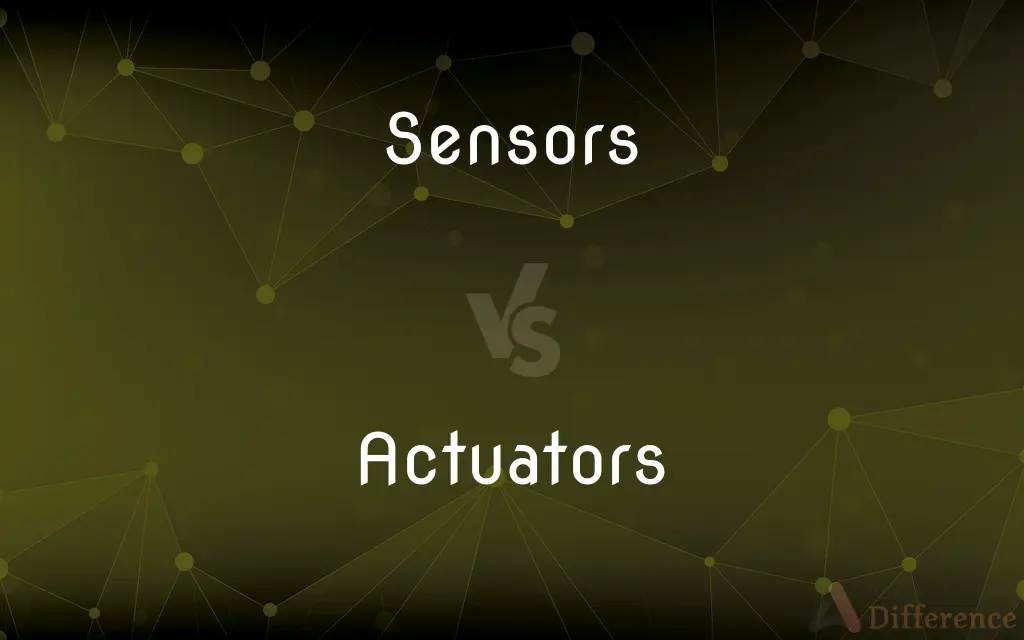Sensors vs. Actuators — What's the Difference?
By Tayyaba Rehman & Urooj Arif — Published on February 9, 2024
Sensors detect changes in the environment, providing data; actuators convert this data into physical movement or action.

Difference Between Sensors and Actuators
Table of Contents
ADVERTISEMENT
Key Differences
Sensors are devices that detect and respond to various types of input from the physical environment, such as light, heat, motion, moisture, pressure, or any one of a great number of other environmental phenomena. Actuators, in contrast, are devices that take an input, usually in the form of electrical signal data from sensors, and use it to move or control a mechanism or system.
The primary function of sensors is to collect data from their surroundings, converting the physical parameter to be measured into a signal which can be understood by an observer or by an instrument. Actuators, on the other hand, are the mechanism by which a control system acts upon the environment. They work upon receiving a signal, typically from the output of a sensor, and act to control a physical change in the system.
Sensors play a crucial role in measuring, monitoring, and collecting data in a wide range of applications, from smartphones to industrial machines. Actuators, however, are responsible for moving or controlling a system or mechanism, turning the data provided by sensors into physical action, such as opening a valve or moving an arm.
The effectiveness of a sensor is determined by its accuracy, sensitivity, range, and responsiveness to the specific stimulus it is designed to measure. Actuators are evaluated based on their precision, efficiency, speed, and compatibility with the control system they are part of.
In summary, sensors are the input devices in a control system, providing valuable information about the environment, while actuators are the output devices that translate this information into a responsive action, effectively bridging the gap between the digital and physical worlds.
ADVERTISEMENT
Comparison Chart
Primary Function
Detect and measure environmental changes
Execute actions based on received data
Role in Systems
Provide input data
Perform output actions
Type of Output
Signals (e.g., electrical, optical)
Physical movement or change
Feedback
Passive (do not affect the environment)
Active (directly alter the environment)
Examples
Temperature sensor, light sensor
Hydraulic piston, electric motor
Compare with Definitions
Sensors
An instrument that responds to a specific physical stimulus and transmits a resulting impulse.
A smoke detector sensor triggers an alarm when it senses smoke.
Actuators
A component of a machine that is responsible for moving or controlling a mechanism or system.
An actuator in a robotic arm moves to assemble parts.
Sensors
A component of an electronic device used to detect external signals.
A camera's light sensor adjusts the brightness based on ambient light.
Actuators
A mechanism that converts energy (often electrical) into motion.
An electric motor actuator rotates the wheels of a conveyor belt.
Sensors
A device that detects or measures physical properties and records, indicates, or otherwise responds to it.
A thermometer is a sensor that measures temperature.
Actuators
A device for moving or controlling something, usually in response to an electrical signal.
A thermostat actuator opens or closes the heating system's valves.
Sensors
A piece of equipment that detects and responds to some type of input from the physical environment.
A soil moisture sensor helps in regulating irrigation in farming.
Actuators
A device used to control a mechanism or system, often activated by a sensor's signal.
An actuator in a car's automatic braking system engages the brakes when necessary.
Sensors
A device that detects changes in quantities such as heat, light, or motion.
Motion sensors activate lights when movement is detected.
Actuators
A mechanical device for moving or controlling something, typically operated by electricity, hydraulic fluid, or pneumatic pressure.
Hydraulic actuators control the flaps on an airplane's wings.
Sensors
A device, such as a photoelectric cell, that receives and responds to a signal or stimulus.
Actuators
One that activates, especially a device responsible for actuating a mechanical device, such as one connected to a computer by a sensor link.
Sensors
See sense organ.
Actuators
Plural of actuator
Sensors
Plural of sensor
Common Curiosities
Are sensors active or passive devices?
Sensors are typically passive, detecting and measuring changes without influencing the environment.
What is a sensor?
A sensor is a device that detects and measures environmental changes, converting them into signals.
What does an actuator do?
An actuator is a device that converts control signals into physical action or movement.
How do sensors work?
Sensors work by detecting specific physical inputs and converting them into readable signals.
What are common types of actuators?
Common actuators include hydraulic pistons, electric motors, and pneumatic cylinders.
Can actuators operate without sensors?
Actuators can operate without sensors but are often more effective when responding to sensor data.
What determines the choice of an actuator in a system?
The choice depends on factors like required movement, precision, and power source.
Can a device be both a sensor and an actuator?
Generally, devices are either sensors or actuators, but some advanced systems may integrate both functions.
Are sensors always electronic?
Most modern sensors are electronic, but some mechanical and chemical sensors also exist.
Can sensors detect all types of physical changes?
Sensors are designed to detect specific types of changes, such as temperature, light, or pressure.
Are actuators only used in machinery?
Actuators are widely used in various applications, from machinery to consumer electronics.
How do sensors and actuators work together?
Sensors provide data about the environment, which actuators use to perform a specific action.
Do sensors need a power source?
Most sensors require a power source to operate, although some can function passively.
Can actuators work with manual input?
Yes, some actuators can be manually operated, though they're commonly controlled electronically.
What is the role of sensors and actuators in automation?
In automation, sensors gather data for decision-making, and actuators execute the actions based on those decisions.
Share Your Discovery

Previous Comparison
Work vs. Business
Next Comparison
Nicene Creed vs. Apostles CreedAuthor Spotlight
Written by
Tayyaba RehmanTayyaba Rehman is a distinguished writer, currently serving as a primary contributor to askdifference.com. As a researcher in semantics and etymology, Tayyaba's passion for the complexity of languages and their distinctions has found a perfect home on the platform. Tayyaba delves into the intricacies of language, distinguishing between commonly confused words and phrases, thereby providing clarity for readers worldwide.
Co-written by
Urooj ArifUrooj is a skilled content writer at Ask Difference, known for her exceptional ability to simplify complex topics into engaging and informative content. With a passion for research and a flair for clear, concise writing, she consistently delivers articles that resonate with our diverse audience.
















































